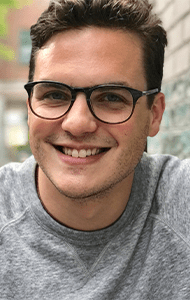Shawn Fayer, MS, CGC, PhD candidate, University of Washington

Position: PhD Candidate – University of Washington, Department of Genome Sciences
ASHG: Can you describe the type of research that has your primary focus?
Shawn Fayer: My research is focused on building new technologies to assess the functional significance of genetic variation and how we can use the data generated from these technologies to improve clinical variant interpretation. Recently, we’ve shown that multiplexed functional assays have significant impact in reinterpretation of VUS in the tumor suppressor genes BRCA1, TP53 and PTEN. Currently, I am working on moving these assays into stem cell models to expand the phenotypic space accessible to multiplexed functional assays.
ASHG: Throughout your life, what have been some of the biggest career goals that you have wanted to accomplish?
Shawn: I hope to run my own academic research lab in the near future with the long term goal of flipping the clinical VUS problem on its head – making VUS a rare finding on clinical sequencing tests. I plan to synthesize my clinical experience working as a genetic counselor with the skills I have developed in my PhD training to develop technologies that will unlock multiplexed functional assays for clinically actionable genes. In addition, I plan to use lessons learned through incorporating these data into clinical interpretations to help shape the next generation(s) of clinical variant interpretation guidelines.
ASHG: What are some of the reasons you chose to study genetics instead of anything else?
Shawn: I first considered a career in genetics during my junior year at the University of Connecticut when I switched majors from fine arts to biology. This shift came after taking a genetics course that introduced me to the power of a genetic diagnosis and the potential for preventative medicine that comes with learning that information. Since then I have been working in genetics either directly with patients or more recently working on technologies to improve genetic testing.
